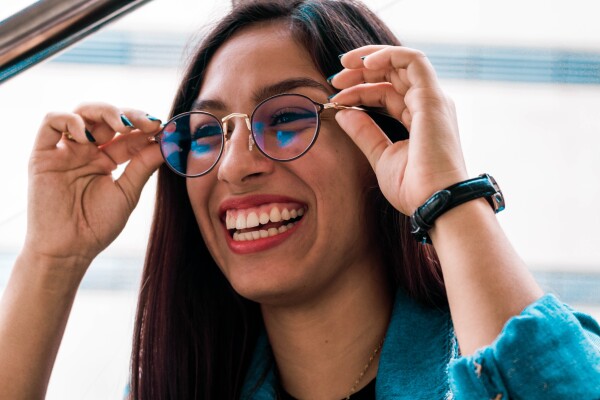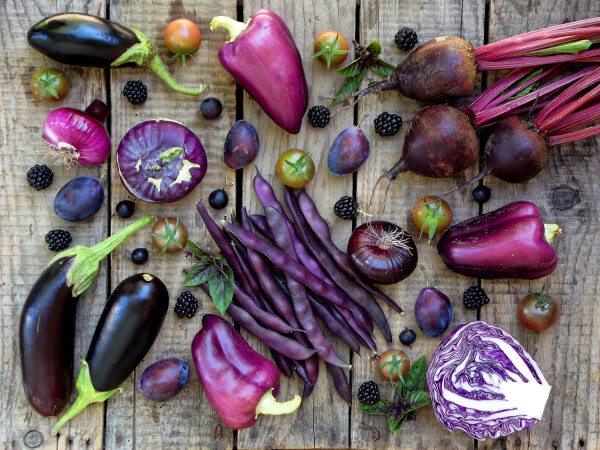Are you familiar with dry eyes and eyeache?
After a long day at the computer, it can become difficult to focus on objects in the distance.
It’s this feeling that gets us searching for simple eye-care solutions.
We know that serious screen time is not good for our eyes. There’s nothing we can do to change the nature of our work though. Our whole lives are on the screens that are damaging the way we see.
Maybe you're aware that blue light blockers and screen protectors are only a band-aid solution. Have you ever considered building up your resistance from the inside?
Evidence shows that blackcurrants can offer blue light protection to act as a long-term solution. Here’s exactly why.

Why is blue light bad?
Blue light is a frequency of light on the visible light spectrum - it’s essential for regulating our circadian rhythm, mood, memory, and alertness.
But, like anything in the body, it’s a matter of balance.
Over a period of time, at significant levels of blue light exposure, the delicate cells at the back of our eyes are at risk of damage. Blue light easily passes through the top layer of our eyes, reaching the retina and exposing them to a frequency of blue light that is unnatural.
Our biggest source of bluelight used to be from the sun; today, the majority of our blue light exposure comes from artificial sources. We are averaging almost 7 hours a day in close proximity to a screen, this is when eye health becomes an issue (1)
Excessive blue light exposure from screens can lead to
Eye fatigue
Difficulty focusing the eyes
Optical headaches from straining
Dry eyes
Sore or irritated eyes
Though blue light is natural and necessary, it becomes an issue with increased frequency and proximity.
There are many things we can do to protect our eyes from excessive blue light exposure (because, with the majority of work being digital today, removing ourselves from screens is not an option). You might consider blue light-blocking glasses, or dimming your screen, but these are all a means to an end; have you ever considered boosting your diet?

Power of purple - anthocyanins for eye health
Anthocyanins are the compounds that create the deep, dark blue of many berries like blueberries, cherries, and blackcurrants. They are part of a group of compounds called flavonoids which are natural antioxidants. Antioxidants help to scavenge free-radicals in your body to protect from oxidation.
In nature, these pigments protect plants from excess blue-green light from the sun -you can think of them as built-in sunscreen! Anthocyanins play many other roles in plant biology -from attracting pollinators to affecting photosynthesis (2)
We can best understand how they affect our eyes by reflecting on their relationship with blocking blue light from the sun. Blue light exposure from the sun helps to regulate our circadian rhythm; anthocyanins help to absorb blue light. Unnatural levels of blue light exposure (from screens and computers) can lead to micro-damage in the retina.
Supplementing with anthocyanin-rich food, such as blackcurrants can protect us from eye strain and retinal damage (3).

Blood circulation in eyes
Anthocyanins help to increase peripheral vasodilation meaning more blood reaches the outer parts of your body, including your eyes. This increased blood supply supports ocular capillary health, keeping you seeing strong despite long hours in front of a screen (4).
The same vasodilatory effect on capillaries means the anthocyanins in blackcurrants also support muscle recovery, and sports performance. Tiny things make a big difference!
Carrots can help you see in the dark: a new look at vitamin C
The age-old wife's tale of carrots bestowing the power to see in the dark night, afterall, hold some truth.
Carrots are high in Vitamin C, just like New Zealand blackcurrants.
Vitamin C has a strong reputation for supporting the immune system, but did you know it also helps your eye health?
Vitamin C is an antioxidant, helping to scavenge free-radicals created by excess blue light damage. It’s also a foundational part of collagen synthesis.
Collagen helps to keep the fiber in our eyes strong.
Blackcurrants are bountiful sources of antioxidants, anthocyanins, and vitamin C, all of which are uniquely essential to strong eyes and protecting your vision from excess blue light.

References
Howarth, J. (2022). Alarming Average Screen Time Statistics (2022). [online] Exploding Topics. Available at: https://explodingtopics.com/blog/screen-time-stats#top-screen-time-stats
Landi, M., Tattini, M. and Gould, K.S. (2015). Multiple functional roles of anthocyanins in plant-environment interactions. Environmental and Experimental Botany, [online] 119, pp.4–17. doi:10.1016/j.envexpbot.2015.05.012.
Silván, J.M., Reguero, M. and de Pascual-Teresa, S. (2016). A protective effect of anthocyanins and xanthophylls on UVB-induced damage in retinal pigment epithelial cells. Food & Function, [online] 7(2), pp.1067–1076. doi:10.1039/c5fo01368b
Moore, E., Litwic, A.E., Belward, P., Taylor, P., Warwick, D. and Dennison, E. (2017). How Do Anthocyanins Affect Peripheral Blood Flow: A Systematic Review. Archives of Clinical and Biomedical Research, [online] 1(1), pp.48–58. Available at: https://www.fortunejournals.com/articles/how-do-anthocyanins-affect-peripheral-blood-flow-a-systematic-review.html [Accessed 13 Jan. 2023].
